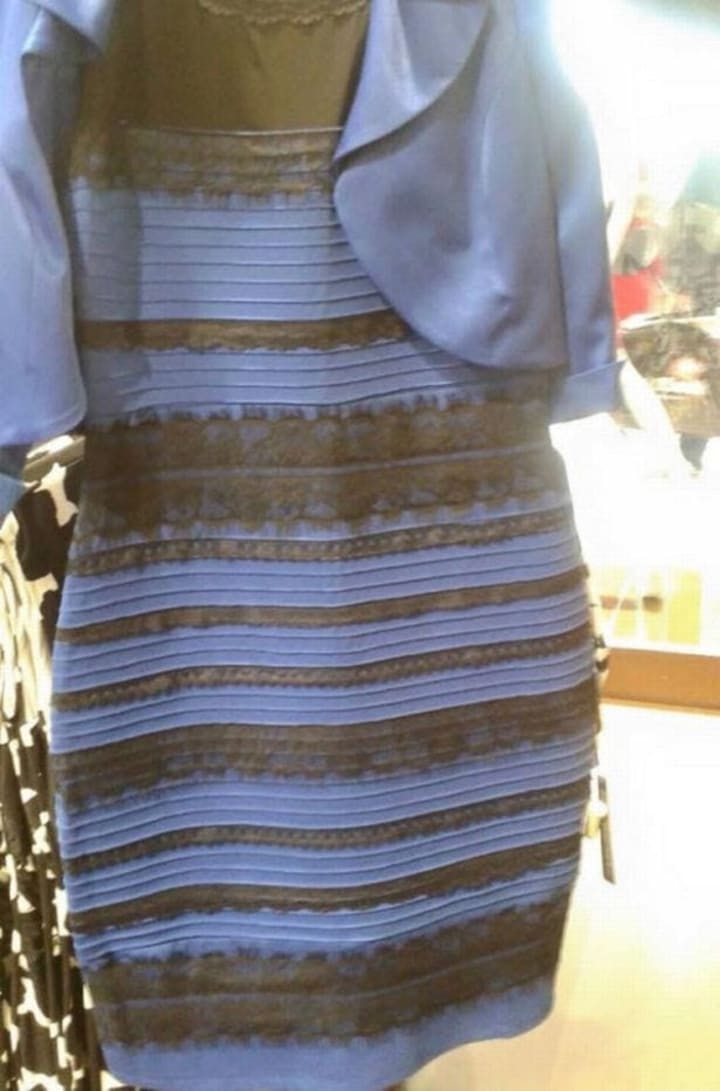Here's Why Your Life is What It Is
Perception is paramount

“Perspective shifts will unlock more than smartness will.” – Dr Astro Teller
Have you ever looked back at a time when your life should have been miserable, but all you have are fond memories? You lived somewhere crummy, you had a terrible job and you were constantly skint, but all you recall are the good times?
That’s perception.
You were probably younger, experiencing things for the first time, everything was more exciting, and you may have been falling in love. So the external factors — the bad job and accommodation, the lack of money — didn’t matter. You were happy and perceived life to be good, so it was good.
However, if you were still in that same job, apartment, and financial situation ten years later, you'd probably be miserable. Why? Because your perception would have shifted. Life no longer fits your expectations and your blueprint. Nothing's changed except you.
“The question is not what you look at, but what you see”. – Henry David Thoreau
When I went through my divorce, I had to leave my marital home and move into a small studio flat as a single man. My kitchen was in my bedroom. People felt sorry for me, and they told me so. What they didn't realise was that I was going through some sort of personal rejuvenation and whilst it was undoubtedly a hard time, I can say it was also a great period of my life that I look back on with affection.
Again, that’s perception.
The same thing applies to the highlight reel people put on social media. A photo of a happy couple, an idyllic home life, or a smiling bunch of friends on a night out may portray a great life, but that individual is only going to be as happy as they percieve their life to be, not the way others perceive it on social media.
Ok, so we all innately know this. Perception isn’t a mind-blowing concept. It is in fact, logical. As sci-fi author and all round clever bod, Douglas Adams once wrote:
“Everything you see or hear or experience in any way at all is specific to you. You create a universe by perceiving it, so everything in the universe you perceive is specific to you.” — Douglas Adams
'That' dress (here comes the science bit)
Here’s a popular example. In the photo below, some people see a black and blue dress and some people see a white and gold dress. That’s the science of perception at work, specific to you. I see white and gold and man oh man I can't even understand how other people see different colours.

But perception is more than just some brains subtracting blue light whilst other brains subtract yellow-gold tones (actual explanation, by the way). Perception is more than just tricks of the mind. Perception is everything. It literally is all we have. We cannot be reality, we can only be a vessel in reality, perceiving it through a five-senses matrix.
Neuroscientist Abhijit Naskar explained this by writing:
“Perception is like painting a scenery — no matter how beautifully you paint, it will still be a painting of the scenery, not the scenery itself.” - Abhijit Naskar
We create reality specific to us by filtering it through our minds and our senses. Therefore, how our mind is set up is crucial to what reality we experience.
Perception is how we think about ourselves, our surroundings, and crucially, the stories we tell ourselves. Perception = Projection.
This is where self-help can veer off the rational road and into the bushes where half-buried, soggy and stained copies of The Secret can be found. But forget that for a moment. Let’s try to stay somewhat logical. Perception is our only tool for understanding the world around us. This, I believe, we can agree on. Therefore, our perception rules our reality. As author Tony Warrick said:
“Everything you perceive, externally, is the manifestation of some internal part of you. If it was not, it would not be present in your perceived reality.” - Tony Warrick
Here’s a theory that’s both comforting and terrifying
I suffered from an OCD with varying degrees of intensity for much of my adult life. When I touch something I perceive as “dirty” — even if I know objectively the object is not dirty — I’m also aware that my perception says the opposite. It screams “This is dirty and it will harm you!”. And because my perception is my reality, it wins the argument.
The OCD can literally “win” over the rational mind because how something makes you feel is more important — or real — than its objective nature.
Phobias (of which OCD is a type) are not logical or rational, they are powerful perceptions that overrule reality. They are a clear example of how perception changes the reality we experience.
This is the Thomas Theorm at play, a theory of Sociology that states if a person defines a situation as real, there are real consequences to be had. An example could be a child who is told monsters live under their bed and therefore will be scared to go to bed and have trouble sleeping.
What we perceive, we experience.
We manifest our own crooked reality just like I manifest mine through my OCD.
The Pygmalion Effect
Another widely acknowledged example of beliefs creating reality is the Pygmalion Effect, a psychological quirk where higher expectations lead to greater performance and results.
This article explains the phenomenon in detail, including the famous Rosenthal and Jacobson paper on the topic which noted that children taking tests who were told they had unusually high IQ performed better.
Once more, perception at play.
Changing perception - A shocking experiement
This all may seem a bit depressing, as if we are under the cosh of our own mental well-being whether it be good or bad. Yet, the good news is perception can be changed and our lives with it. People with OCD can be cured. Those who once hated can love.
The bad news is that changing your perception isn’t simply like changing your opinion about Coldplay or whether or not you like peaches, it’s much more of a fundamental shift and takes a huge effort.
Author and CEO Matt Manero wrote:
“The greatest challenge in life is not the struggle you face, but rather what goes on inside your own head.” - Matt Manero
Ultimately, we present our greatest struggle to ourselves.
So how do we change perception?
As if to illustrate the power change holds and the efforts it takes, a complex experiment was run by Harvard psychologist, Ellen Langer in 1979 where she attempted to prove many of aging’s negative effects could be reduced and even erased by psychological intervention — i.e. Changing perception.
This psychological intervention was extensive: 8 men in their 70s were housed in a controlled environment where everything was as if it was 1959. Old crooners played on the vintage radio, Ed Sullivan was on the black-and-white TV, and even the books and the magazines lying around were dated to the end of the 1950s. The men were then instructed to behave as if it were actually 1959.
Also, no provisions were made for their septuagenarian status. No one carried bags or helped them upstairs and the only images of themselves were photos of when they were young. There weren't even any mirrors in the house.
They stayed in this house for a week whilst a control group, also of men in their 70s, simply met and reminised about the past.
Seven days on, both the control and experimental groups showed improvements in “...physical strength, manual dexterity, gait, posture, perception, memory, cognition, taste sensitivity, hearing, and vision.” Langer wrote this in her book about the experiment (‘Counterclockwise’).
Yet Langer notes these improvements were much more significant in the 1959 house residents. 63% of them had better intelligence scores after the experiment compared to only 44% in the control group.
Even weirder, if not slightly subjective, volunteers who knew nothing about the study looked at before and after photos of the men in the house and said those in the “after” photos looked an average of 2 years younger than those in the “before” photos.
On day seven of the study, Langer noted the men who had seemed so frail just days before moving into the house ended up playing an impromptu touch football game on the front lawn.
Essentially, by changing the elderly person’s perception of their age, Langer stopped them acting and feeling old. As she herself said:
“Wherever you put the mind, you’re necessarily putting the body.” - Ellen Langer
Admittedly, this was a complex and small experiment but its hypothesis is backed up over the years. One obvious example is the placebo effect is so powerful drug trials have to account for the power of the mind to produce drug-like results in test patients.
Furthermore, a BBC article highlighted studies that found it wasn’t just the amount exercise people undertook that made a difference to their fitness, but crucially, how fit they perceived themselves to be.
Such is the power of the mind.
Here’s why self-fulfilling prophecies are real
Perception is our only tool to navigate the world and therefore a great predictor of the quality of our life and our subjective reality. The studies above are interesting, though I’m sure you may feel you innately knew this information anyway. I sure did.
We all know that if a person surrounds themselves with hate and negativity their life isn’t going to be a bed of roses. We’ve always known this.
Going back to Confucius in 500 BC, he said:
“The man who says he can, and the man who says he cannot, are both correct” — Confucius
And it was Ghadi who said:
“Men often become what they believe themselves to be. If I believe I cannot do something, it makes me incapable of doing it. But when I believe I can, then I acquire the ability to do it even if I didn’t have it in the beginning.” — Ghandi
The question is, therefore, if we innately know this, why do we doubt it so much? Why do we rage and gnash teeth at the world when change always comes from within?
Perhaps it is because the promise we can change reality is too great to believe. Results are slow and come sporadically or in hidden ways. Reality is stubbon. As Albert Einstein once said:
“Reality is merely an illusion, albeit a very persistent one.” - Albert Einstein
Or maybe we dismiss this entire premise because changing perception to create a new reality is too wrapped up in the mumbo-jumbo “laws of attraction” literature. The Secret might arguably be based in truth, but it’s too damn sickly sweet to be taken seriously — or at least to be consumed in public.
Or perhaps it’s simply that it takes too much effort to turn your perception ship around. Not everyone can live in a house that replicates the heady days of our youth, therefore changing perception takes a lot of inner work. It is akin to turning around a cruise liner, it’s slow and takes up a lot of time, concentration, and effort.
When effort is high and results are not forthcoming, we often give up.
Still, if your life is not what you want it to be, start from inside.
Trying to change external factors before looking internally is like trying to cut down a tree by ignoring the roots. It is smart to begin at the source. As ancient philosopher Jalaluddin Mevlana Rumi wrote:
“Yesterday I was clever, so I wanted to change the world. Today I am wise, so I am changing myself.” — Rumi
Be wise and change yourself rather than the world. It’s not going to be easy, but ourselves is the only thing we really have control over anyway.
About the Creator
Jamie Jackson
Between two skies and towards the night.






Comments (1)
Great story on perspective!